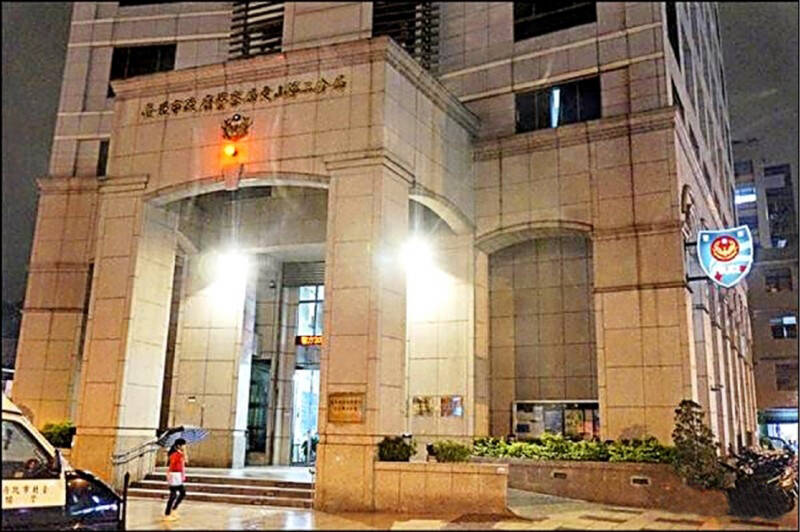Taipei police on Wednesday arrested an Uber driver and his wife for allegedly defrauding the delivery app giant and its partners of nearly NT$8.4 million (US$259,644) by using fake accounts and forging banking information.
The main suspect, a 27-year-old man surnamed Chen (陳), was accused of engaging in two schemes following his employment as an Uber driver in 2019, a spokesperson of Taipei Police Department’s Wenshan Second Precinct said.
Chen allegedly created fake user accounts, which he utilized to make and then cancel orders from six phony restaurants he also created.

Photo: Taipei Times file
As the fake accounts used cash as the default payment option, Uber would compensate Chen’s restaurants for supposed monetary losses, police said, adding that the suspect deactivated the user accounts before the app could charge them.
Chen allegedly made NT$5.7 million before being detected, police said.
In 2021, Chen reapplied to work as an Uber sales coordinator and made use of his position to allegedly divert payments worth NT$2.67 million from legitimate restaurants to his private bank accounts, they said.
Uber detected the irregularity due to the crudity of Chen’s more recent scheme and froze his account before calling police, police said, adding that the suspect had fled to Taichung by that time.
Investigators tracked Chen via his IP address and bank accounts, they said.
Chen and his wife, who helped set up some of the fake restaurants, were arrested and questioned prior to being transferred to the Taipei District Prosecutors’ Office on recommended charges related to forgery, fraud and tampering with computer data, police said.
Uber said the app has been upgraded since Chen’s actions, and its partners should rest assured that transactions on the platform are safe.
Separately, the Changhua District Court handed down a guilty verdict for another couple in connection to a receipt mill scam that cheated NT$3.73 million out of the uniform invoice lottery.
The husband-and-wife duo, also surnamed Chen (陳), were coconspirators of a man surnamed Tseng (曾), who allegedly founded seven shell corporations passing as companies specializing in water treatment, the court said.
Tseng apparently used these companies as receipt mills that churned out invoices on an industrial scale, court documents said.
In November 2016, the Chens started to work for Tseng and the couple’s job consisted entirely of printing invoices for payments for goods and services worth NT$1 to NT$3, the court said.
The husband printed 65 winning invoices worth NT$13,000 in the first month, 569 winning invoices worth NT$140,000 in the following month, and 2,096 invoices worth close to NT$430,000 in his best month, it said.
Tseng cashed the receipts via intermediaries, including several people who habitually collected the winnings from the same convenience store, arousing suspicion from its owner, the court said.
Changhua prosecutors opened an investigation into the suspicious receipts and issued indictments for Tseng and his coconspirators, it said.
The judge assigned to the case sentenced the husband to two years and six months in prison and his wife to two years in prison, in addition to five years of deferred jail time, the court said.
The judgement was relatively lenient on account of the couple’s quick confession to the crime, willingness to pay back the government and having three children, it said.

An essay competition jointly organized by a local writing society and a publisher affiliated with the Chinese Communist Party (CCP) might have contravened the Act Governing Relations Between the People of the Taiwan Area and the Mainland Area (臺灣地區與大陸地區人民關係條例), the Mainland Affairs Council (MAC) said on Thursday. “In this case, the partner organization is clearly an agency under the CCP’s Fujian Provincial Committee,” MAC Deputy Minister and spokesperson Liang Wen-chieh (梁文傑) said at a news briefing in Taipei. “It also involves bringing Taiwanese students to China with all-expenses-paid arrangements to attend award ceremonies and camps,” Liang said. Those two “characteristics” are typically sufficient

A magnitude 5.9 earthquake that struck about 33km off the coast of Hualien City was the "main shock" in a series of quakes in the area, with aftershocks expected over the next three days, the Central Weather Administration (CWA) said yesterday. Prior to the magnitude 5.9 quake shaking most of Taiwan at 6:53pm yesterday, six other earthquakes stronger than a magnitude of 4, starting with a magnitude 5.5 quake at 6:09pm, occurred in the area. CWA Seismological Center Director Wu Chien-fu (吳健富) confirmed that the quakes were all part of the same series and that the magnitude 5.5 temblor was

The brilliant blue waters, thick foliage and bucolic atmosphere on this seemingly idyllic archipelago deep in the Pacific Ocean belie the key role it now plays in a titanic geopolitical struggle. Palau is again on the front line as China, and the US and its allies prepare their forces in an intensifying contest for control over the Asia-Pacific region. The democratic nation of just 17,000 people hosts US-controlled airstrips and soon-to-be-completed radar installations that the US military describes as “critical” to monitoring vast swathes of water and airspace. It is also a key piece of the second island chain, a string of

The Central Weather Administration has issued a heat alert for southeastern Taiwan, warning of temperatures as high as 36°C today, while alerting some coastal areas of strong winds later in the day. Kaohsiung’s Neimen District (內門) and Pingtung County’s Neipu Township (內埔) are under an orange heat alert, which warns of temperatures as high as 36°C for three consecutive days, the CWA said, citing southwest winds. The heat would also extend to Tainan’s Nansi (楠西) and Yujing (玉井) districts, as well as Pingtung’s Gaoshu (高樹), Yanpu (鹽埔) and Majia (瑪家) townships, it said, forecasting highs of up to 36°C in those areas